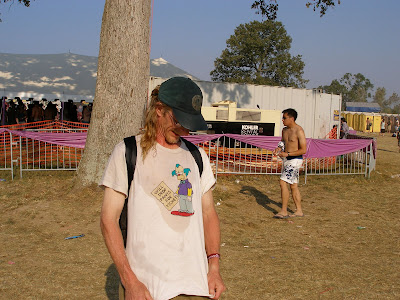Sorry for the long hiatus but I've been traveling in Europe for the past three weeks, and when I travel I cover some territory, no time for blogging. Here's the list of places, favorites first:
1) Frankfurt
2) Brussels
3) Amsterdam
4) Berlin
5) Cologne
6) Manchester
7) Cambridge
8) London
I was in Cambridge for the
Freedom Week conference, which was interesting and I appreciate the opportunity. Here we are punting on the river Cam.

English culture, on the other hand, scores at the bottom for me. It is way too class oriented, with a separating equilibrium created by the two main classes struggling to distance themselves from one another, understandably. At the bottom are Chavs, which stands for council housing and violent. Every city has them. In London it's the cockney, also called hoodies because they dress like American thug-rappers. But hoodies don't make videos, they kill people. At the other end, the top I suppose, are some sort of Monty Python caricature of landed gentry. These people are wise to remain landed, as they would get seriously beaten up anywhere outside of England.
London is prospering primarily because their immigration laws are less restrictive than ours, thanks to the EU. Immigrants generally run the place, and they form the bulk of the middle class. The ones I talked to would jump at the chance to live and work in the US.
Manchester seemed to be a little less class conscious, people are more open and friendly, and the beer is cheaper. So it wins the England category hands down. It's a good place for a 13 hour pub crawl. Thanks Mark!
Next for the Continent where I visited friends in Berlin and Frankfurt, and along the way stopped in places I hadn't seen before, places that I had skipped for a reason. But there were a couple of nice surprises. Particularly, Frankfurt is awesome. The parks are lovely, the women are lovely, the beer gardens and cafes are pleasant, and the tourists are few. It makes me want to work for the European Central Bank.

The second best surprise was Brussels. It's something like a mini-Paris, but with good and cheap Belgian beer. And not too many tourists. Here's Che
Habana Cafe, where I imagine the EU regulators hang out.

Amsterdam's Vondel Park was also a nice surprise. But I'll stop here with the photos, the rest are on facebook: Will McBride in the Washington, DC network.
Addendum: I forgot to mention the IG Farben building in Frankfurt, which alone is worth the trip. Besides being an architectural marvel, the excellent exhibit there tells perhaps the most chilling interest group story of all, i.e. how IG Farben financed Hitler's rise to power and in return received lucrative military contracts. Here is one conspiratorial view. Anti-capitalists and capitalists alike should come together on one thing: Capitalism is dangerous only when it becomes tied to the coercive powers of the state.


















































